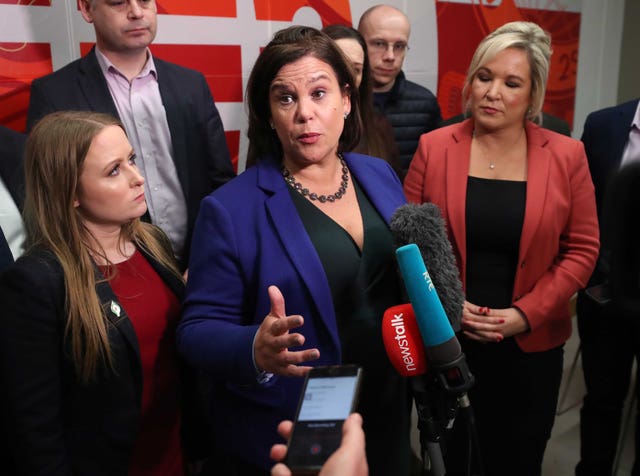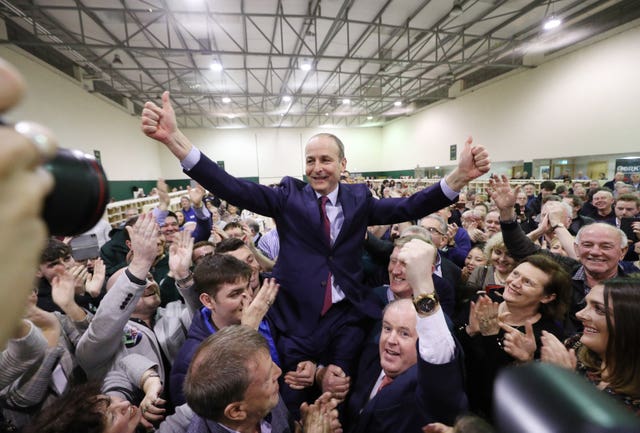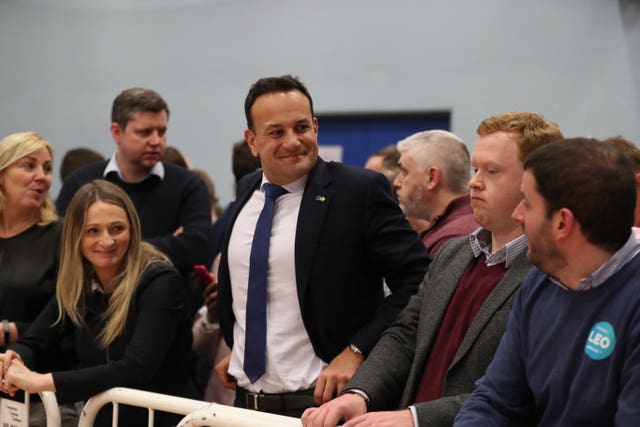
Mary Lou McDonald has predicted she could be poised to become Ireland’s next leader.
The Sinn Fein president insisted she may lead a new government as taoiseach as her party continued to bask in a remarkable General Election result that saw it top the popular vote, shattering Fianna Fail and Fine Gael’s long-time grip on power.
On an impromptu walkabout in Dublin city centre, Mrs McDonald said: “I may well be the next taoiseach, yes.”
She later told the media: “I think it would be a mighty thing to have a Sinn Fein taoiseach and also a woman perhaps in the job but you might say she would say that wouldn’t she?”
Asked whether she believes she can lead a government, Mrs McDonald responded: “The numbers will tell me that when the numbers are finally tallied.”
Proud to lead. On this day two years ago I was Elected President of @sinnfeinireland This weekend we made history – all of us, together. pic.twitter.com/CWVxZkhLBG
— Mary Lou McDonald (@MaryLouMcDonald) February 10, 2020
Counting continued on Monday and, by 8.40pm, 146 of the Dail’s 160 seats were filled.
Despite receiving the most first preference votes, Sinn Fein’s place in the next government is not guaranteed.
The party failed to run enough candidates to capitalise on its surging popularity in Ireland, so it will not finish up with the most seats.
READ MORE: Government defends deportation flight amid criticism and legal challenges
Fianna Fail is on course to be the largest party though Sinn Fein could finish in second place behind outgoing Taoiseach Leo Varadkar’s Fine Gael, which is the big loser of the poll.
All three parties will fall well short of reaching the 80 seats required for a Dail majority so, barring another election, some form of coalition is inevitable.
The task of forming a government could be a long and tortuous one and may force either Fianna Fail or Fine Gael to back-track on long-standing pledges never to do business with Sinn Fein.
 (PA Graphics)
(PA Graphics)
Mrs McDonald said that Sinn Fein’s preference is a government without Fianna Fail or Fine Gael.
She said: “Ultimately the numbers will decide and ultimately a government has to be formed.
“If that’s not the case, there is of course always the possibility of another election.
“I know other people are talking about that. I think that’s absolutely premature at this stage because the seats are only being filled and I do believe given that Sinn Fein primarily has been returned as the vehicle for change and for new government, but also that the Greens and the Social Democrats have been returned equally with that bounce and that mandate.
“I think there is scope for us to do something new and constructive.
“I have spoken to (Labour leader) Brendan Howlin, to (Green party leader) Eamon Ryan, we are in contact with the Social Democrats, People Before Profit.
“Obviously we would be anxious to talk to a number of independents, so that work is is ongoing.”
 Sinn F??in president Mary Lou McDonald (centre) addresses the media in Dublin, after speaking with Sinn F??in’s national executive committee, as Northeern Ireland’s Deputy First Minister Michelle O’Neill (right) looks on.
Sinn F??in president Mary Lou McDonald (centre) addresses the media in Dublin, after speaking with Sinn F??in’s national executive committee, as Northeern Ireland’s Deputy First Minister Michelle O’Neill (right) looks on.
Earlier, a senior Fianna Fail politician described a coalition with Sinn Fein as “untenable”.
Jim O’Callaghan also insisted his party leader, Micheal Martin, had not softened his stance on ruling out the party as government partners.
“We need to recognise we gave a commitment and when you look at the policy differences between Sinn Fein and Fianna Fail, I don’t think it’s tenable to suggest that we should be in coalition with them,” he said.
Mr O’Callaghan’s views are not echoed by all his colleagues, with some Fianna Fail members having indicated a willingness to do business with the party.
READ MORE: Keir Starmer campaign team brands suggestion it broke data rules as 'scurrilous'
Mr Varadkar has maintained his pre-election stance and ruled out any Fine Gael/Sinn Fein coalition.
Mrs McDonald’s preference is for a coalition of left-wing parties, without any input from the centre right Fianna Fail and Fine Gael.
However, it is doubtful whether such an alliance could generate the sufficient numbers for a majority.
 Micheal Martin is under pressure to reconsider his stance on not governing with Sinn Fein (Yui Mok/PA)
Micheal Martin is under pressure to reconsider his stance on not governing with Sinn Fein (Yui Mok/PA)
Another permutation could see the exclusion of Sinn Fein, with Fine Gael and Fianna Fail entering power together in a so-called “grand coalition”, though that prospect looks unlikely at this stage.
Smaller parties and groupings such as the Greens, Labour, the Social Democrats and Solidarity/People Before Profit, and a sizeable number of independent TDs, may all be courted as the main parties seek junior coalition partners.
Mrs McDonald has pledged to work to form a “people’s government” and get to grips with crises in housing and health – the issues that featured so prominently on the campaign trail.
“This election has certainly been seismic and historic, it’s been an election that’s really been driven by a demand for change by the people,” she said.
“Sinn Fein won the election, we won the popular vote, we’ve recorded an historic victory for our party but the election is much more than that.
“The election is about a real appetite for political change, and that means a change in government.
“We asked the people to vote for Sinn Fein, the chance to demonstrate what government looks like when citizens and families are put at the centre of government.
“I hope that we can deliver such a government because I am very clear that the people who came out and voted for Sein Fein voted for Sinn Fein to be in government.”
 Leo Varadkar’s Fine Gael had a disappointing election and is set to finish third (Liam McBurney/PA)
Leo Varadkar’s Fine Gael had a disappointing election and is set to finish third (Liam McBurney/PA)
Sinn Fein received 24.5% of the vote share on first preference in Saturday’s election, Fianna Fail got 22.2% and Fine Gael 20.9%.
On Monday, Fine Gael Finance Minister Paschal Donohoe said no party had an automatic right to govern.
“It is clear that no political party in our country has a monopoly on representing the people of Ireland,” he said.
Sinn Fein has been left to rue its decision to run half the number of candidates of its two main rivals.
That has seen a significant number of Sinn Fein surplus votes being transferred to other parties in the proportional representation contest.
The could ultimately benefit Sinn Fein in the final shakedown, if its surpluses boost the numbers of potential left wing partners in government.
On Sunday, Mr Martin declined to repeat his pre-election pledge never to do business with Sinn Fein.
He later cautioned observers not to “jump the gun” in interpreting his remarks as a signal an alliance with the party was in the offing.
There are 160 seats in the Dail parliament.
The speaker is automatically re-elected, leaving 159 seats up for grabs and 80 the magic number for a majority.
Mr Varadkar’s last government, a minority Fine Gael-led administration that included several independent TDs, was sustained in power through a historic confidence and supply arrangement with Fianna Fail.
That landmark pact between two parties founded from opposing sides of Ireland’s civil war of the 1920s took 70 days to negotiate following the inconclusive 2016 general election.



Why are you making commenting on The Herald only available to subscribers?
It should have been a safe space for informed debate, somewhere for readers to discuss issues around the biggest stories of the day, but all too often the below the line comments on most websites have become bogged down by off-topic discussions and abuse.
heraldscotland.com is tackling this problem by allowing only subscribers to comment.
We are doing this to improve the experience for our loyal readers and we believe it will reduce the ability of trolls and troublemakers, who occasionally find their way onto our site, to abuse our journalists and readers. We also hope it will help the comments section fulfil its promise as a part of Scotland's conversation with itself.
We are lucky at The Herald. We are read by an informed, educated readership who can add their knowledge and insights to our stories.
That is invaluable.
We are making the subscriber-only change to support our valued readers, who tell us they don't want the site cluttered up with irrelevant comments, untruths and abuse.
In the past, the journalist’s job was to collect and distribute information to the audience. Technology means that readers can shape a discussion. We look forward to hearing from you on heraldscotland.com
Comments & Moderation
Readers’ comments: You are personally liable for the content of any comments you upload to this website, so please act responsibly. We do not pre-moderate or monitor readers’ comments appearing on our websites, but we do post-moderate in response to complaints we receive or otherwise when a potential problem comes to our attention. You can make a complaint by using the ‘report this post’ link . We may then apply our discretion under the user terms to amend or delete comments.
Post moderation is undertaken full-time 9am-6pm on weekdays, and on a part-time basis outwith those hours.
Read the rules here